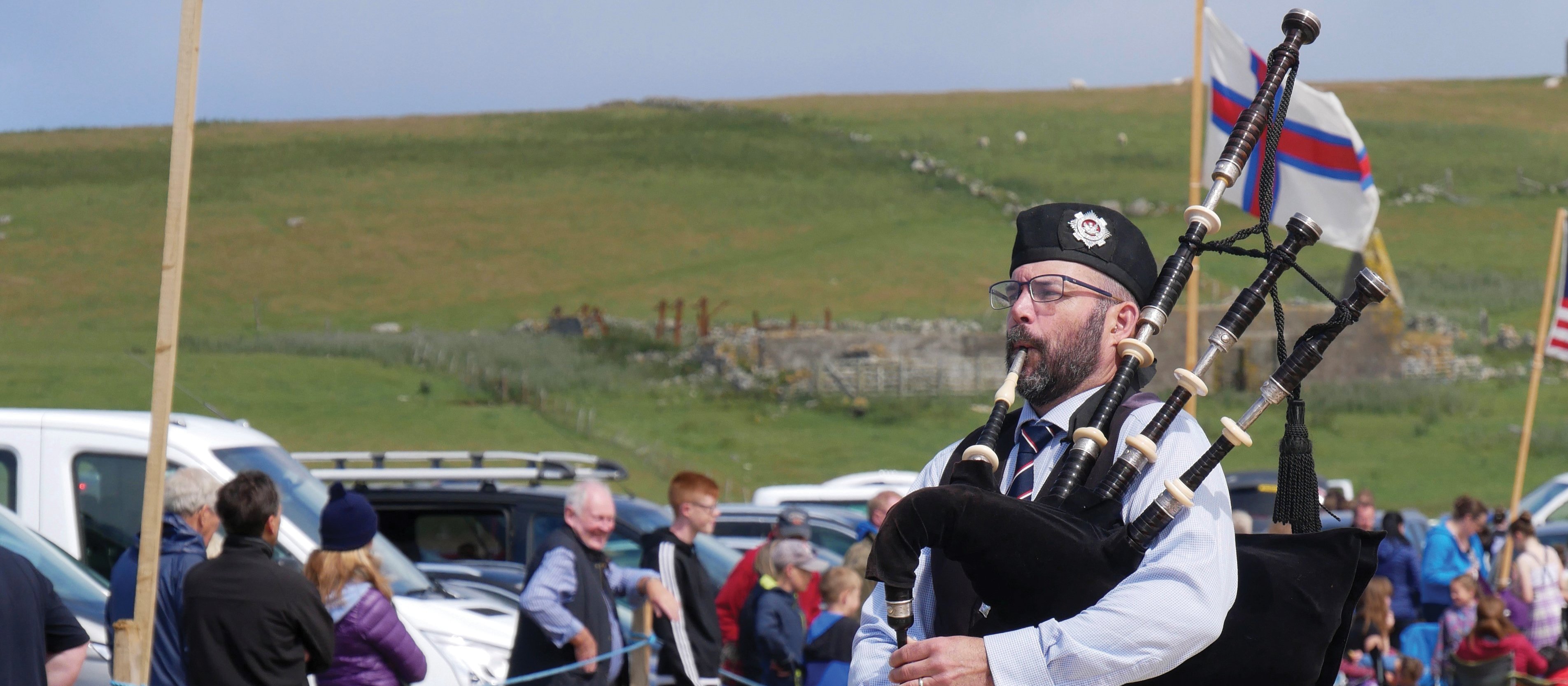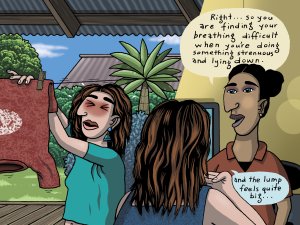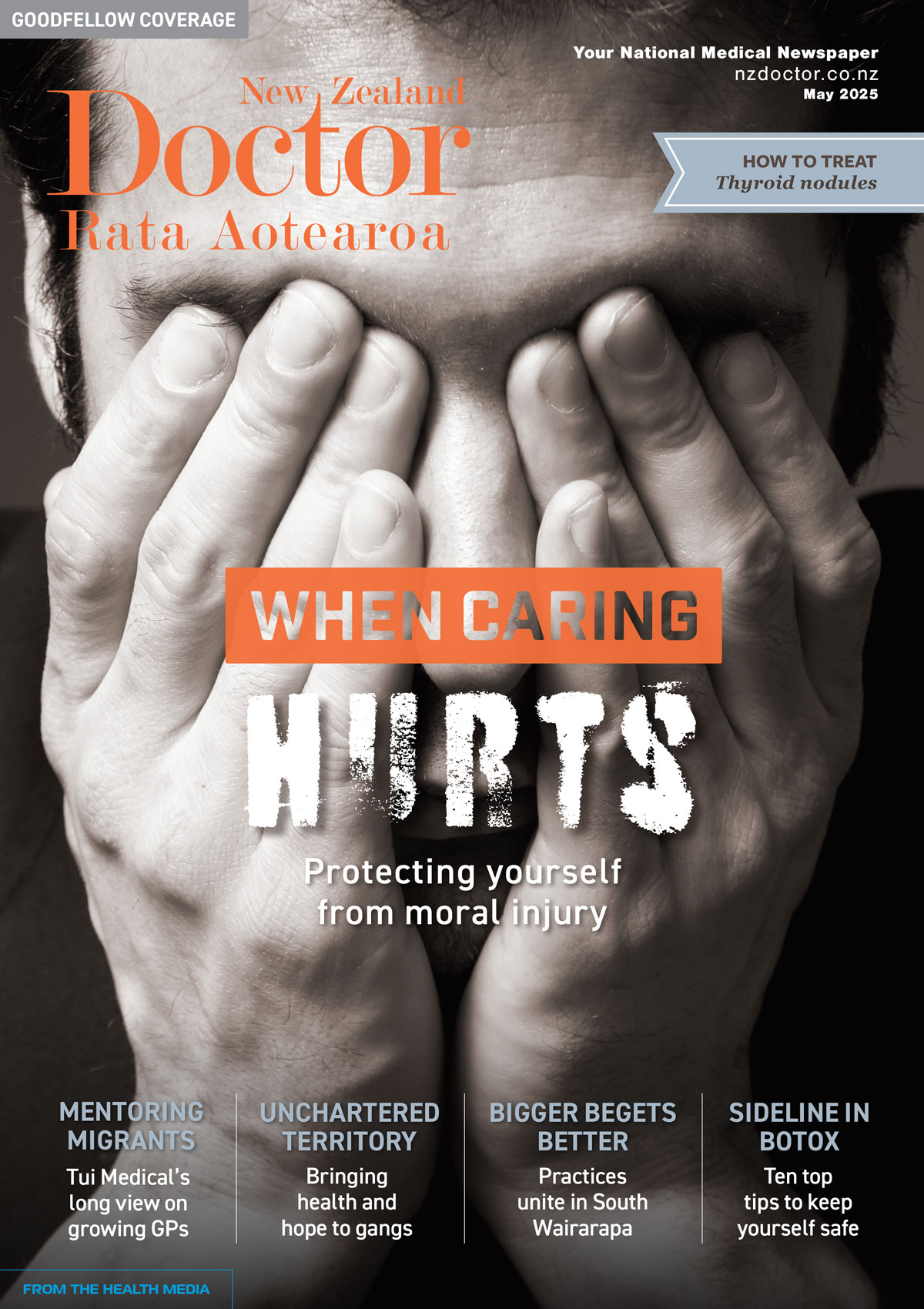Otolaryngologist, head and neck surgeon Francis T. Hall discusses the evaluation of thyroid nodules, which primarily aims to determine the likelihood of malignancy. He then reviews the treatment of thyroid nodules and thyroid cancer, including recent advances in management
Te Aroha’s bagpiping GP: Pipe playing is his lucky charm for love and life
Te Aroha’s bagpiping GP: Pipe playing is his lucky charm for love and life

SPARE TIME
Zahra Shahtahmasebi talks to a specialist GP for whom the pipes are always calling
It was a bit awkward through school years – I was laughed at for wearing a “dress”
Brendon Eade could talk about the bagpipes all day, given the time. The Te Aroha specialist GP says, while there’s no denying that bagpipes are a polarising instrument – people seem to either love them or hate them – for him it’s definitely the former: “I have a genuine passion for the instrument.”
It helps that they’ve been his very own good luck charm – especially in love – it was through the pipes that he met his wife Meleana.
Dr Eade finds medicine and the bagpipes go hand in hand too; both require a considerable amount of discipline, concentration and preparation.
“They feed each other, and the lessons learnt in each can be translated to the other.”
He says he’s also been lucky to have had incredible mentors, both in New Zealand and overseas, including Lewis Turrell, who sadly passed away in 2011.
“He was the first non-Scottish person in 1958 to win the gold medal in Scotland...I’ve been involved with key figures and history.”
Dr Eade first picked up the instrument as a 10-year-old. After three years of piano playing, the pipes were instantly a “natural fit”.
Choosing an instrument that required wearing a kilt when played wasn’t perhaps the wisest decision to have made as a young boy, he laughs.
“It was a bit awkward through school (years) – I was laughed at for wearing a ‘dress’.”
But, undeterred by these comments, the pipes saw him through teenagehood and even when he moved from Hamilton to Auckland, to go to medical school.
At the time of his sixth-year elective placement, he chose to go to Scotland, for the sole purpose of developing his piping, while working, of course.
“Any piper who is worth one’s salt, goes to Scotland to test themselves.”
In Scotland, he encountered many great tutors including world-renowned bagpiper and GP Angus MacDonald (“Is there a more Scottish name than that?”), who he befriended and even stayed with.
He came back to New Zealand after his elective and finished medical school, but had a hankering to return to Scotland. Just before he did, a friend introduced him to Meleana, a talented piper who was looking at joining a pipe band.
“I was pumped about going back to Scotland to further my piping career, and she decided to come along for the ride.”
They were staying in Scotland while Dr Eade underwent postgraduate training in general practice, before returning to New Zealand in 2004.
It was during this five-year stint that he discovered many other doctors in Scotland who were also pipers. He also laughs that being a piper in Scotland “opens lots of doors”, referring to when he managed to get a job from attending a Highland Games event.
“There was a man there whose wife was a GP in Inverness and was looking for staff – he phoned her then and there.”
In New Zealand, he’s won at least every major piping prize at least once, including the Silver Chanter, the Silver Clasp, and the Comunn na Piobaireachd NZ gold medal.
While bagpiping might be a “marginal activity” in New Zealand, in Scotland, it is very mainstream, Dr Eade laughs, which means the threshold for success is much higher.
“There’s more depth, and a higher number of quality players, where you have to qualify just to participate in some of the bigger competitions and fight your way through.”
However, this didn’t stop him from achieving success over there too – winning the silver medal and the A Grade, March, Strathspey & Reel (MSR) at the 2003 and 2010 Northern Meetings in Inverness respectively.
The Northern Meeting is a global piping competition, which only selects a total of 100 entrants to take part in its various events.
The COVID-19 pandemic has been a huge setback for the way it has ground global and local competing to a halt. But there have been some silver linings, says Dr Eade.
In 2020, the World Piping and Drumming Championships moved online, and is now run every three months. Competitors film themselves performing and upload the videos to YouTube.
Dr Eade was crowned the World Online Solo Open Champion across three categories: MSR, Hornpipe and Jig, in the very first event. Of the five competitions that have been held in the last year, he has won three times.
Highlights of his bagpipe career include playing during the rugby Lions Tour in 2019 and with the New Zealand Symphony Orchestra, where he got to play alongside his sister, a flautist.
He whiles away most evenings with his pipes, playing anywhere from 30 to 90 minutes a day and, although he loves competing, he is also an active teacher.
With two talented piper parents, it probably comes as no surprise the Eade children also play, with one a piper and one a drummer in a youth pipe band.
When most people think of the bagpipes, they think of songs like “Amazing Grace”, but the songs Dr Eade competes with are classic pieces, mostly composed in Scotland in the 1500s and 1600s, and can range from five to 25 minutes long.
“This keeps me enthusiastic – studying, learning and educating. There’s a big repertoire that is being passed down through generations.”
One of the biggest hurdles for learning the bagpipes is the fact you don’t start with the pipes for at least six to 12 months, says Dr Eade.
Instead, you start with a chanter which helps you learn the finger technique, before having to learn the mechanics of controlling the bag.
But on the whole, Dr Eade says playing the bagpipes is a “wonderful pastime” that has taken him from local fundraisers, to global competitions, to travelling around Scotland, and is a love shared with his family.
“It is a rich instrument and has had a positive impact on my career and personal life, it’s unique and special, and the odd bit of recognition here and there fulfills my competitive drive.
“The pipes have contributed a lot to my life, and who I am,” he says. “I’m very well known in Te Aroha as the bagpipe doctor.”
We've published this article as a FREE READ so it can be read and shared more widely. Please support us and our journalism – subscribe here





![Barbara Fountain, editor of New Zealand Doctor Rata Aotearoa, and Paul Hutchison, GP and senior medical clinician at Tāmaki Health [Image: Simon Maude]](/sites/default/files/styles/thumbnail_cropped_100/public/2025-03/Barbara%20Fountain%2C%20editor%20of%20New%20Zealand%20Doctor%20Rata%20Aotearoa%2C%20and%20Paul%20Hutchison%2C%20GP%20and%20senior%20medical%20clinician%20at%20T%C4%81maki%20Health%20CR%20Simon%20Maude.jpg?itok=-HbQ1EYA)
![Lori Peters, NP and advanced health improvement practitioner at Mahitahi Hauora, and Jasper Nacilla, NP at The Terrace Medical Centre in Wellington [Image: Simon Maude]](/sites/default/files/styles/thumbnail_cropped_100/public/2025-03/2.%20Lori%20Peters%2C%20NP%20and%20advanced%20HIP%20at%20Mahitahi%20Hauora%2C%20and%20Jasper%20Nacilla%2C%20NP%20at%20The%20Terrace%20Medical%20Centre%20in%20Wellington%20CR%20Simon%20Maude.jpg?itok=sUfbsSF1)
![Ministry of Social Development health and disability coordinator Liz Williams, regional health advisors Mary Mojel and Larah Takarangi, and health and disability coordinators Rebecca Staunton and Myint Than Htut [Image: Simon Maude]](/sites/default/files/styles/thumbnail_cropped_100/public/2025-03/3.%20Ministry%20of%20Social%20Development%27s%20Liz%20Williams%2C%20Mary%20Mojel%2C%20Larah%20Takarangi%2C%20Rebecca%20Staunton%20and%20Myint%20Than%20Htut%20CR%20Simon%20Maude.jpg?itok=9ceOujzC)
![Locum GP Helen Fisher, with Te Kuiti Medical Centre NP Bridget Woodney [Image: Simon Maude]](/sites/default/files/styles/thumbnail_cropped_100/public/2025-03/4.%20Locum%20GP%20Helen%20Fisher%2C%20with%20Te%20Kuiti%20Medical%20Centre%20NP%20Bridget%20Woodney%20CR%20Simon%20Maude.jpg?itok=TJeODetm)
![Ruby Faulkner, GPEP2, with David Small, GPEP3 from The Doctors Greenmeadows in Napier [Image: Simon Maude]](/sites/default/files/styles/thumbnail_cropped_100/public/2025-03/5.%20Ruby%20Faulkner%2C%20GPEP2%2C%20with%20David%20Small%2C%20GPEP3%20from%20The%20Doctors%20Greenmeadows%20in%20Napier%20CR%20Simon%20Maude.jpg?itok=B0u4wsIs)
![Rochelle Langton and Libby Thomas, marketing advisors at the Medical Protection Society [Image: Simon Maude]](/sites/default/files/styles/thumbnail_cropped_100/public/2025-03/6.%20Rochelle%20Langton%20and%20Libby%20Thomas%2C%20marketing%20advisors%20at%20the%20Medical%20Protection%20Society%20CR%20Simon%20Maude.jpg?itok=r52_Cf74)
![Specialist GP Lucy Gibberd, medical advisor at MPS, and Zara Bolam, urgent-care specialist at The Nest Health Centre in Inglewood [Image: Simon Maude]](/sites/default/files/styles/thumbnail_cropped_100/public/2025-03/7.%20Specialist%20GP%20Lucy%20Gibberd%2C%20medical%20advisor%20at%20MPS%2C%20and%20Zara%20Bolam%2C%20urgent-care%20specialist%20at%20The%20Nest%20Health%20Centre%20in%20Inglewood%20CR%20Simon%20Maude.jpg?itok=z8eVoBU3)
![Olivia Blackmore and Trudee Sharp, NPs at Gore Health Centre, and Gaylene Hastie, NP at Queenstown Medical Centre [Image: Simon Maude]](/sites/default/files/styles/thumbnail_cropped_100/public/2025-03/8.%20Olivia%20Blackmore%20and%20Trudee%20Sharp%2C%20NPs%20at%20Gore%20Health%20Centre%2C%20and%20Gaylene%20Hastie%2C%20NP%20at%20Queenstown%20Medical%20Centre%20CR%20Simon%20Maude.jpg?itok=Z6u9d0XH)
![Mary Toloa, specialist GP at Porirua and Union Community Health Service in Wellington, Mara Coler, clinical pharmacist at Tū Ora Compass Health, and Bhavna Mistry, specialist GP at Porirua and Union Community Health Service [Image: Simon Maude]](/sites/default/files/styles/thumbnail_cropped_100/public/2025-03/9.%20Mary%20Toloa%2C%20Porirua%20and%20Union%20Community%20Health%20Service%20in%20Wellington%2C%20Mara%20Coler%2C%20T%C5%AB%20Ora%20Compass%20Health%2C%20and%20Bhavna%20Mistry%2C%20PUCHS%20CR%20Simon%20Maude.jpg?itok=kpChr0cc)